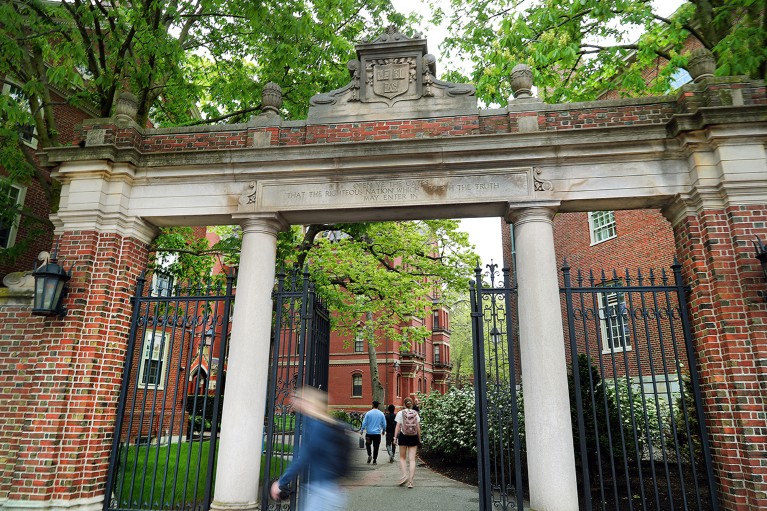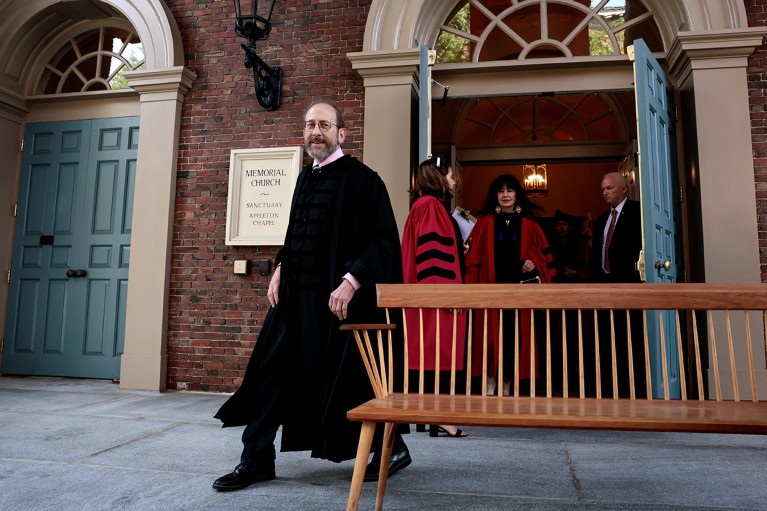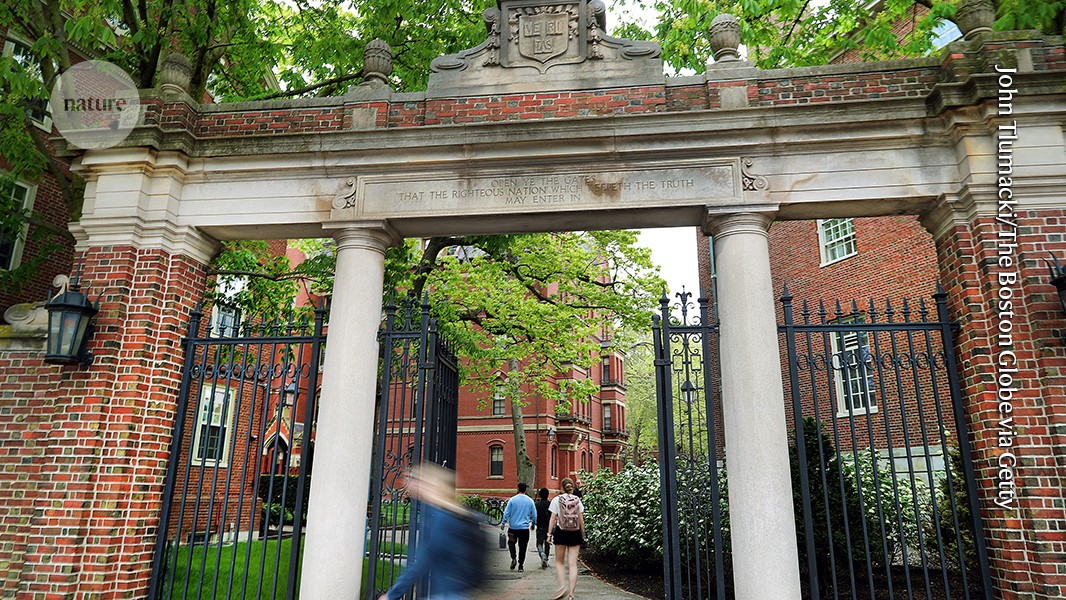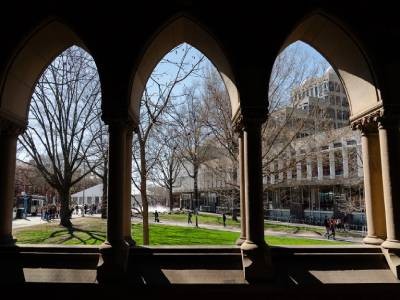
Students enter Harvard Yard, on the university’s main campus in Cambridge, Massachusetts.Credit: John Tlumacki/The Boston Globe via Getty
As the US government slashes Harvard University’s funding, the damage to research at the school is becoming clearer. Nature has learnt that researchers at the university have lost nearly 1,000 grants worth more than US$2.4 billion.
Will US science survive Trump 2.0?
Last week, the administration of US President Donald Trump announced the terminations in a press release, but did not specify how many would be targeted or list individual grants. Nature obtained the figures from a variety of sources, including US funding agency employees and an online volunteer tracking effort at grant-watch.us.
An e-mail to Harvard from the US National Science Foundation (NSF) lists 193 grants worth nearly $150 million as being terminated, and one from the US Department of Defense (DoD) logs 56 grants worth $105 million. Other cuts are smaller: for instance, the Department of Agriculture and the Department of Housing and Urban Development each terminated three grants. But by far, the largest tranche comes from the US National Institutes of Health (NIH), the world’s largest funder of biomedical science: it is cutting more than 600 grants worth about $2.2 billion over multiple years. The cuts do not include Harvard-affiliated hospitals.
Through research grants, the US government funds about 11% of Harvard’s annual $6.4 billion budget, and these cancellations will be devastating, researchers say. “Harvard cannot, even with its vast resources, just make up for this loss of federal funding,” says Joseph Loparo, a biological chemist at Harvard Medical School in Boston, Massachusetts, who lost two NIH grants for studying repair processes in DNA totalling $4.3 million.
In the crosshairs
Harvard, whose main campus is in Cambridge, Massachusetts, is one of the most prestigious universities in the world — and the wealthiest — with its $53-billion endowment. The university has been a prime target for the Trump administration as it seeks to eradicate what it calls ‘woke’ ideology from US campuses. According to The New York Times, Trump posed the possibility of never paying Harvard its allotment of grant money during a private luncheon on 1 April. “Wouldn’t that be cool?” he asked. On Thursday, the US Department of Homeland Security made the extraordinary announcement that it had cancelled Harvard’s ability to enroll international students — a substantial revenue stream. Today, the university sued, and a US judge quickly placed a temporary freeze on the Trump administration’s policy until a hearing can be held.
Although the Trump administration has terminated grants at other research institutions — such as Columbia University in New York City — the cancellations at Harvard are exceptional in scale. The vast majority of the university’s NIH awards have been terminated, for example. And the cuts across multiple agencies include funding for stated priorities of the Trump administration, such as artificial intelligence and quantum physics. A $20-million grant for a quantum materials centre was axed, along with several multimillion-dollar grants for quantum computing. Many of these grants have multi-institution collaborators whose funding situation is unclear.
Alan Garber, Harvard’s president, arrives for a graduation ceremony at the university.Credit: Craig F. Walker/The Boston Globe via Getty
The Trump team has alleged that Harvard and other universities have fostered an environment of antisemitism. In e-mails it sent justifying the grant terminations, the administration said that Harvard has also engaged in “race discrimination” in admissions.
In early April, government officials contacted Harvard and presented it with a list of demands that must be met in order for the university to continue receiving federal money, some of which would give the government oversight of its admissions and hiring practices. Harvard denied the request publicly, saying that it would be a violation of academic freedom. In response, the administration froze the institution’s research grants. Harvard sued on 21 April, arguing that the government was withholding federal funding “as leverage to gain control of academic decisionmaking at Harvard”.
When asked for a response to last week’s terminations, a Harvard spokesperson pointed Nature to public comments made by university president Alan Garber on 14 May: “We stand behind our thousands of outstanding faculty, postdoctoral, staff, and student researchers. Together they continue to make revolutionary discoveries, cure illness, deepen our understanding of the world, and translate that understanding into impact … It is crucial for this country, the economy, and humankind that this work continue.”
The White House and the DoD did not respond to Nature’s request for comment, and the NSF declined to comment. A spokesperson from the US Department of Health and Human Services, which oversees the NIH, stated that “The HHS is taking decisive action to uphold civil rights and protect taxpayer investments in higher education.”
Laboratory losses
Scientists at Harvard who have lost funding spoke to Nature about the impact of the terminations on their research.
How Trump’s attack on universities is putting research in peril
David Charbonneau, an exoplanet researcher at Harvard, had a multi-year NSF grant worth $538,000 terminated with one year to go. The grant funded operation of the Arizona-based Tierras Observatory, which records tiny dips in light from stars — a tell-tale sign of a planet from outside the Solar System passing in front of them. Charbonneau has managed to secure funding from Harvard to pay the postdoctoral fellow who has been operating Tierras for the next year, but beyond that it’s unclear what will happen. “How does cutting a research grant in astrophysics to look for planets orbiting other stars address antisemitism on campus?” Charbonneau asks.
Postdocs and students are some of the primary targets of the administration’s cuts. The NSF cut a $43-million grant that included all of Harvard’s funding for the agency’s graduate research fellowship programme. An NSF source who requested anonymity because they are not authorized to speak to the press tells Nature that the fellowships have not been terminated, but that students cannot access the funds unless they transfer to a new institution.




